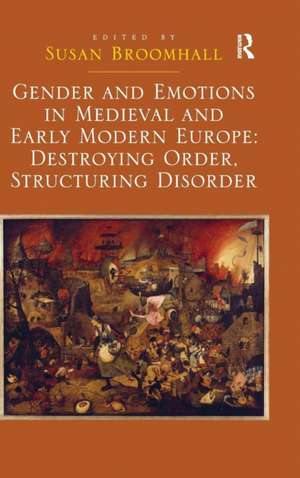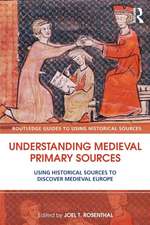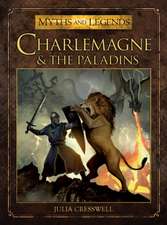Gender and Emotions in Medieval and Early Modern Europe: Destroying Order, Structuring Disorder
Autor Susan Broomhallen Limba Engleză Hardback – 10 noi 2015
| Toate formatele și edițiile | Preț | Express |
|---|---|---|
| Paperback (1) | 389.66 lei 6-8 săpt. | |
| Taylor & Francis – 12 dec 2019 | 389.66 lei 6-8 săpt. | |
| Hardback (1) | 1008.17 lei 6-8 săpt. | |
| Taylor & Francis – 10 noi 2015 | 1008.17 lei 6-8 săpt. |
Preț: 1008.17 lei
Preț vechi: 1229.48 lei
-18% Nou
Puncte Express: 1512
Preț estimativ în valută:
192.92€ • 199.33$ • 160.48£
192.92€ • 199.33$ • 160.48£
Carte tipărită la comandă
Livrare economică 19 martie-02 aprilie
Preluare comenzi: 021 569.72.76
Specificații
ISBN-13: 9781472453273
ISBN-10: 1472453271
Pagini: 282
Ilustrații: Includes 26 b&w illustrations
Dimensiuni: 156 x 234 x 18 mm
Greutate: 0.68 kg
Ediția:Revised
Editura: Taylor & Francis
Colecția Routledge
Locul publicării:Oxford, United Kingdom
ISBN-10: 1472453271
Pagini: 282
Ilustrații: Includes 26 b&w illustrations
Dimensiuni: 156 x 234 x 18 mm
Greutate: 0.68 kg
Ediția:Revised
Editura: Taylor & Francis
Colecția Routledge
Locul publicării:Oxford, United Kingdom
Cuprins
Introduction: destroying order, structuring disorder: gender and emotions, Susan Broomhall. Part I Structuring Emotions of War and Peace: ‘Now evil deeds arise’: evaluating courage and fear in early English fight narratives, Andrew Lynch; Order, emotion, and gender in the crusade letters of Jacques de Vitry, Megan Cassidy-Welch; Married noblewomen as diplomats: affective diplomacy, Tracy Adams; Ordering distant affections: fostering love and loyalty in the correspondence of Catherine de Medici to the Spanish court, 1568-1572, Susan Broomhall. Part II Chronicling Feelings of Disaster and Ruin: Emotions and the social order of time: constructing history at Louvain’s Carthusian House, 1486-1525, Matthew S. Champion; A landscape of ruins: decay and emotion in late medieval and early modern antiquarian narratives, Alicia Marchant; ‘O, Lord, save us from shame’: narratives of emotions in convent chronicles by female authors during the Dutch revolt, 1566-1635, Erika Kuijpers; Recasting images of witchcraft in the later 17th century: the witch of Endor as ritual magician, Charles Zika. Part III Aligning Children, Familial, and Religious Communities: ‘That the boys come to school half an hour before the girls’: order, gender, and emotion in school, 1300-1600, Annemarieke Willemsen; An ordered cloister? Dissenting passions in early modern English cloisters, Claire Walker; ‘Will we ever meet again?’ Children travelling the world in the late 17th and 18th centuries, Claudia Jarzebowski; Gendered power and emotions: the religious revival movement in Herrnhut in 1727, Jacqueline Van Gent. Select bibliography; Index.
Notă biografică
Susan Broomhall is Professor of Early Modern History at The University of Western Australia.
Descriere
States of emotion were vital as a foundation to society in the premodern period, employed as a force of order to structure diplomatic transactions, shape dynastic and familial relationships, and align religious beliefs, practices and communities. At the same time, societies understood that affective states had the potential to destroy order, creating undesirable disorder and instability that had both individual and communal consequences. This volume argues that the ways in which emotions created states of order and disorder in medieval and early modern Europe were deeply informed by contemporary gender ideologies. Together, the essays reveal the critical roles that gender ideologies and lived, structured, and desired emotional states played in producing both stability and instability.








